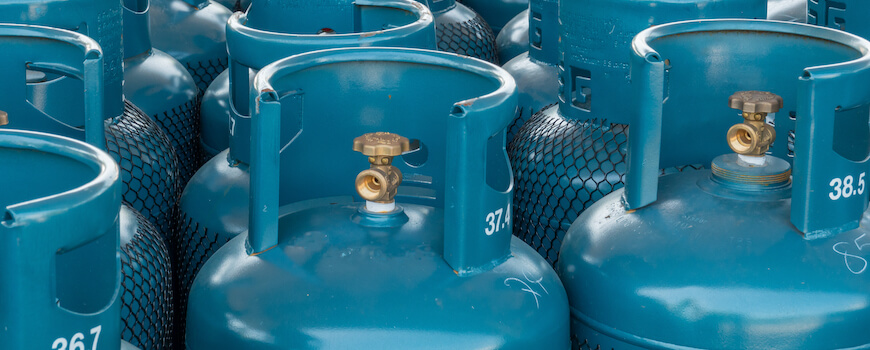
Natural gas and propane are both very popular fuels when it comes to heating or fueling vehicles. And although sometimes people tend to use them as synonyms, there are big differences between them. In this article, we compare natural gas to propane and highlight the greatest differences between them.
What is natural gas?
Natural gas is a non-renewable, odourless, colourless, flammable, and non-toxic hydrocarbon. It is a gas mixture, and its main component is methane, which makes up around 70-90% of it. There are other gases in the mixture as well: propane, butane, and ethane.
Once natural gas is extracted from the ground it needs to be combined with crude oil to get the fuel we use on a daily basis. During this process propane, butane, and ethane are extracted.
What is propane?
Propane is a non-toxic, colourless, and odourless gas, which is usually compressed and stored in liquid form.
The biggest source of propane is natural gas processing. As mentioned above, it is a by-product of the processing. Propane also can be a by-product of crude oil refinement.
What are the biggest differences between propane and natural gas?

While the two gases have a lot of similarities (e.g. both are clean-burning, colourless, and odourless), there are a lot of differences between propane and natural gas.
- 1. Energy efficiency: While comparing fuels, it is always important to compare how much energy we can get using the same amount. For this comparison, we will use BTUs, which stands for British Thermal Units and is a measurement of thermal energy.
Using one cubic foot of natural gas produces 1030 BTUs. Using one cubic foot of propane produces 2516 BTUs. This means that if we use the same amount from both, we get 2,5 times the energy from propane.
- 2. Cost: We can only talk about cost after we have talked about energy efficiency. The good news is that it is really easy to compare propane and natural gas prices. If the propane’s price is given in gallons, first it needs to be converted to cubic meters/feet (this is how natural gas is usually measured). Once this is done, we need to multiply the natural gas price by 2.5. This way we will be able to buy the same amount of energy for the calculated prices. Of course, this only works if we are just strictly curious about the cost-energy ratio and we ignore other factors like eco-friendliness.
- 3. Eco-friendliness: Natural gas and propane are both clean-burning gases. Propane is actually the cleanest burning amongst fossil fuels and natural gas is not far behind. If this is the case, why is propane considered to be green fuel and natural gas is not?
For a fuel to be green, it needs to be eco-friendly before and after its combustion. And this is true for propane. If propane is leaked to the atmosphere it does not cause any damage. However, the case is different with natural gas. The main component of natural gas is methane, which is a greenhouse gas.
That is why it is really important to try to avoid natural gas leaks and accidents, so that it cannot get into the atmosphere.
- 4. Household use and transportation: Natural gas and propane are both popular for heating and cooking at home. The biggest difference between the household use of natural gas and propane is their delivery method.
Natural gas is delivered to homes via gas pipelines. This means that once gas pipelines are connected to a home, gas is available 24/7.
Propane, on the other hand, is usually stored in a liquid form in propane tanks. These tanks can be delivered anywhere, even to places where gas pipelines are not available. The drawback is that propane tanks need to be refilled, and if for some reason refills are not possible (for example because of a big storm), the household can be left without heat.
- 5. Safety: Propane and natural gas are both odourless and colourless. In order to make detection easier manufacturers add chemicals like ethyl mercaptan to these gases. These additional chemicals are harmless but have a strong, unpleasant odour – which makes detection easier.
One important difference between propane and natural gas is their density. Propane is heavier than air and natural gas is lighter. This means that in closed spaces (like homes) if there is a leak, propane will be concentrated on the floor level, while natural gas will be located higher, at the ceiling level.
Natural gas vs propane: conclusion
There are a lot of similarities and differences between natural gas and propane. Both are odourless, colourless, and clean-burning fossil fuels.
Propane is more energy-efficient and considered to be a green fuel, while natural gas is not. Natural gas is delivered to houses via gas pipelines. Propane is delivered in propane tanks. Lastly, propane is heavier than air, but natural gas is lighter. This makes propane leaks more dangerous.
